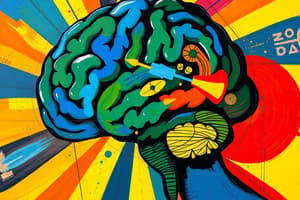Podcast
Questions and Answers
What is the primary function of episodic memory?
What is the primary function of episodic memory?
- To provide insight into future events
- To learn through observation
- To store universally accepted knowledge
- To recall specific experiences and events (correct)
How does consolidation relate to episodic and semantic memory?
How does consolidation relate to episodic and semantic memory?
- It prevents forgetting of episodic memories.
- It separates episodic and semantic memories.
- It enhances episodic memories without losing details.
- It transfers information from the hippocampus to the cerebral cortex. (correct)
What distinguishes autobiographical memory from episodic memory?
What distinguishes autobiographical memory from episodic memory?
- Autobiographical memory lacks detail.
- Autobiographical memory includes more structure and detail. (correct)
- Autobiographical memory is less organized.
- Autobiographical memory is not related to personal experiences.
What characteristic of episodic memory makes it prone to errors and illusions?
What characteristic of episodic memory makes it prone to errors and illusions?
What type of learning does NOT involve explicit intent to acquire knowledge?
What type of learning does NOT involve explicit intent to acquire knowledge?
Which of the following is NOT a type of memory mentioned?
Which of the following is NOT a type of memory mentioned?
What happens to the episodic details of a memory as it consolidates into a semantic memory?
What happens to the episodic details of a memory as it consolidates into a semantic memory?
What is an example of implicit learning?
What is an example of implicit learning?
What is operant conditioning primarily concerned with?
What is operant conditioning primarily concerned with?
What does implicit learning involve?
What does implicit learning involve?
According to Levels of Processing theory, which type of analysis is considered the most effective for learning?
According to Levels of Processing theory, which type of analysis is considered the most effective for learning?
In Craik & Tulving's study, what was the primary factor that influenced memory recall?
In Craik & Tulving's study, what was the primary factor that influenced memory recall?
Which of the following best describes explicit learning?
Which of the following best describes explicit learning?
What phenomenon was illustrated in Bandura's Bobo Doll Study?
What phenomenon was illustrated in Bandura's Bobo Doll Study?
What is the purpose of the Serial Reaction Time task in implicit learning?
What is the purpose of the Serial Reaction Time task in implicit learning?
Which of the following factors does NOT influence explicit learning?
Which of the following factors does NOT influence explicit learning?
What distinguishes declarative memory from non-declarative memory?
What distinguishes declarative memory from non-declarative memory?
Which type of memory refers to knowledge of general facts about the world?
Which type of memory refers to knowledge of general facts about the world?
What is a characteristic of implicit learning?
What is a characteristic of implicit learning?
According to Atkinson & Shiffrin’s model, how is short-term memory (STM) characterized?
According to Atkinson & Shiffrin’s model, how is short-term memory (STM) characterized?
What type of non-declarative memory involves 'knowing how' to perform tasks?
What type of non-declarative memory involves 'knowing how' to perform tasks?
Which of the following is NOT a type of explicit (declarative) memory?
Which of the following is NOT a type of explicit (declarative) memory?
Which memory system is characterized by intentional recall of past experiences?
Which memory system is characterized by intentional recall of past experiences?
In terms of memory systems, how does long-term memory differ from short-term memory?
In terms of memory systems, how does long-term memory differ from short-term memory?
What is the main factor that Craik and Tulving suggested improves memory retention?
What is the main factor that Craik and Tulving suggested improves memory retention?
Which method emphasizes making information meaningful related to oneself to enhance memory?
Which method emphasizes making information meaningful related to oneself to enhance memory?
What does the encoding specificity principle state about memory retrieval?
What does the encoding specificity principle state about memory retrieval?
According to Morris et al. (1977), recognition memory is improved when what aspect is aligned?
According to Morris et al. (1977), recognition memory is improved when what aspect is aligned?
What is the distinctiveness effect in memory?
What is the distinctiveness effect in memory?
What does the testing effect suggest about memory retention?
What does the testing effect suggest about memory retention?
Which of the following describes implicit learning distinctly from explicit learning?
Which of the following describes implicit learning distinctly from explicit learning?
Which type of processing is emphasized by survival relevance to enhance memory?
Which type of processing is emphasized by survival relevance to enhance memory?
Study Notes
Long-Term Memory (LTM)
-
LTM stores a variety of information, including:
Episodic, Semantic and Autobiographical Memory
- Episodic Memory: Specific events, experiences, and memories stored with details of place, time, and context.
- Semantic Memory: General knowledge, facts, and concepts about the world.
- Autobiographical Memory: Memories of significant personal experiences and events.
Explicit vs. Implicit Learning
- Explicit learning is deliberate and conscious.
- Implicit learning is unintentional and unconscious.
- Classical Conditioning: Learning associations between stimuli and consequences (e.g. Pavlovian dog salivation, fear of spiders).
- Operant Conditioning: Learning to change behavior based on rewards and punishments (e.g. training a dog, getting a pay raise).
- Observational Learning: Learning through watching others (e.g. a child mimicking their parents, learning a new skill by watching a tutorial).
Models of Memory
- Atkinson & Shiffrin's Model (1968): This model distinguishes between Short-Term Memory (STM) as a temporary buffer and Long-Term Memory (LTM) as a permanent store.
- Complementary Learning Systems (McClelland et al., 1995): This model proposes that recent experiences and episodic memories are initially formed in the hippocampus and then transferred to the cerebral cortex via a process called consolidation.
- Consolidation: During sleep, new information is integrated with old information, transforming episodic memories into more semantic memories.
Explicit Learning Processes
- Levels of Processing Theory (Craik & Lockhart, 1972): Deeper processing of information leads to more effective learning and memory retention.
- Shallow Processing: Processing focuses on physical aspects of a stimulus (e.g., if a word is written in uppercase or lowercase).
- Deep Processing: Processing focuses on meaning or semantic aspects of a stimulus (e.g., understanding the meaning of a word or its relationship to a sentence).
- The Testing Effect (Roediger & Karpicke, 2006): Frequent retrieval practice during learning improves retention.
- Retrieval practice is more effective than simply rereading material.
Distinctiveness Effect
- Memory traces that stand out from others are easier to remember.
- Distinctiveness acts as a retrieval cue, reducing interference effects.
- Example: "Giraffe" would be more memorable amongst a list of words like "cushion," "lamb," and "stove."
Implicit Learning vs Explicit Learning
- Evidence from Amnesic Patients: Amnesic patients have impaired explicit memories but relatively intact implicit memories, suggesting that these forms of learning involve different brain processes.
- Age-Related Differences: Explicit learning is more susceptible to decline with age than implicit learning.
Studying That Suits You
Use AI to generate personalized quizzes and flashcards to suit your learning preferences.
Related Documents
Description
Explore the nuances of Long-Term Memory (LTM), including episodic, semantic, and autobiographical memory. Understand the differences between explicit and implicit learning, along with classical and operant conditioning. This quiz will help reinforce your comprehension of these significant psychological concepts.




